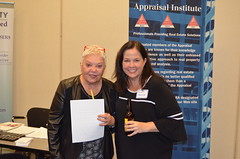Monthly Archives: December 2014
ICAP Directors Recognized in 2014
2014 ICAP President, Rich deVerdier, MAI, SRA, AI-GRS recognized the following outgoing ICAP Directors in the December ICAP Board of Directors meeting for their years of service on the ICAP Board.
Michael A. Wolin, MAI, SRA
Thomas Rodgers, MAI, SRA
David L. Dubois, MAI
Rich deVerdier presented the following ICAP Directors for their dedicated service in past years for the advancement of ICAP, each serving multiple terms on the ICAP Board.
Michael A. Wolin, MAI, SRA
Thomas Rodgers, MAI, SRA
Karen Emerle, SRA
2014 ICAP Treasurer Mike Morris, ARA, MAI recognized James R. Blaydes, SRA for years of service and leadership to ICAP on the ICAP Legislative Committee.
The board of directors approved the following new board members:
Joe Calvanico, ASA, MAI from CC ASA
Mary B. Fortune, SRA from CCIA
Victoria Pierce, MAI, AI-GRS from CCIA
Susan Z. Ulman, MAI from CCIA
The board also approved the 2015 Executive Board:
President Rick Hiton, IFAS
Vice President Mike Morris, ARA, MAI
Treasurer Barton DeLacy, MAI, CRE, FRICS
Secretary Ken Mrozek, MAI, SRA
More information about your ICAP Board of Directors can be found at http://icapweb.com/board_of_directors.php.
Happy Birthday ICAP!
It was on this day (December 20th) 1994 that the Illinois Coalition of Appraisal Professionals summited their articles of incorporation to Illinois Sectary of State. According to ICAP’s Articles of Incorporation ICAP’s purposes and powers are as follows:
1. The Corporation is organized and shall be operated to promote the common interests of real estate appraisers licensed or certified by the State of Illinois;
2. To educate and communicate with members of the appraisal profession about legislative and regulatory issues;
3. To represent the interests of members in government affairs by monitoring, proposing, supporting or opposing laws, regulations, rules, and/or proposals that affect the appraisal profession at the local, State and National levels;
4. To establish and maintain contacts with legislators, regulators, and related professional organizations;
5. To consult with or engage, when necessary, a professional government relations firm to provide assistance in connection with the State regulatory, legislative, and/or administrative matters concerning the appraisal profession;
6. To foster and promote the appraisal profession to the general public through communication, research, and publications;
7. To raise funds necessary to administer the Coalition and use such funds to carry out the purposes and objectives of the Coalition; and
8. To support the maintenance and improvement of the Uniform Standards of Professional Appraisal Practice (US PAP) and its effective enforcement by the State.
ICAP’s mission is to promote the appraisal profession and its image to the general public and to users of appraisal services. ICAP initiates discussion and analysis of issues affecting professional appraisers and monitors political action with the intent to influence legislation, regulation and public opinion toward the appraisal profession.
20 Years later ICAP remains dedicated to its purpose and mission and looks forward to another 20 Years!
4th Quarter President’s Message
4th Quarter
President’s Message
December 17th, 2014
Message from:
Richard deVerdier, 2014 ICAP President
As ICAP’s 20th Anniversary comes to a close I would like to thank the hundreds of people throughout the years who made this organization possible. To those people, “Thank you!” Thank you to all of the board of directors, executives, employees and committee members for all of your efforts on behalf of our organization.
ICAP is especially indebted to the men and women who have led this organization for the past 20 years. Thank you to all of our Past Presidents for your service!
1995 Michael S. MaRous, MAI, SRA
1996 Donald K. Cochran, ARA
1997 Donald K. Cochran, ARA
1998 Bradley H. Ellis,
1999 Patrick Alesandrini, MAI, SRA
2000 John Miaso
2001 Stephanie Englehart
2002 Randall L. Neff, SRA
2003 Michael A. Harris, Jr.
2004 Timothy J. McCarthy, SRA
2005 Margaret M. Murray, IFA
2006 Gary D. Harvey, SRA,
2007 Mark E. Akers, ARA
2008 Michael J. Maglocci, MAI,
2009 Steve Thomas, ASA
2010 James R. Blaydes, SRA
2011 Sharon L. Bagby, SRA
2012 Tamara J. Bellisario, IFA
2013 Peter D. Poulos, MAI, 2013
I’m very excited about the direction ICAP is headed and I’m confident in the abilities of our incoming President, Rick Hiton. Rick has the support of a talented Board of Directors and together they will do great things.
I have really enjoyed and appreciated my opportunity to serve.
Thanks again.
Respectfully,
Richard deVerdier, MAI, SRA, AI-GRS
2014 ICAP President
Fall 2014 AARO Conference
On behalf of ICAP, Director Brian Masterson recently attended the fall conference of the Association of Appraisal Regulatory Officials (AARO) and the public meeting of the Appraisal Standards Board (ASB). The following is his report.
The meetings were held in Washington DC between October 17th-20th. Both the conference and meeting were heavily attended by state and federal regulators, appraisal practitioners, trade groups, and vendors. Attending the meetings provided with me the opportunity to meet those responsible for setting the policies that impact appraisal professionals as well as the people responsible for their enforcement. There was much discussion at both the ASB and AARO meetings. Below is a summary of both meetings. Please note that my intent is to focus on those issues that most heavily impact the practicing real estate appraiser. Any opinions expressed are either my own or are those of the individuals in attendance at the meetings and may not necessarily be reflective of ICAP’s sponsoring organizations, governmental bodies, or other interested parties.
The public meeting of the Appraisal Standards Board (ASB) was held on Friday Morning. It was held at the Marriott Metro Center and was scheduled to start at 9:00 am. By 8:45 the room was already filled and it would remain standing room only until it was adjourned shortly before noon. The ASB is charged with the development, interpretation, and amendment of the Uniform Standards of Professional Appraisal Practice (USPAP), with the goal of promoting and maintaining public trust in appraisal practice by establishing requirements for appraisers. USPAP is periodically updated through the adoption, amendment, and retirement of standards as well the issuing of advisory opinions. Before any changes are made to USPAP the ASB issues an Exposure Draft and welcomes comment from appraisal practitioners, industry participants, and the general public. The ASB’s public meetings provide not only an opportunity to provide comment on proposed changes, but also an opportunity for an open discussion amongst those in favor of and those opposed to suggested changes as well as the opportunity for clarification of intent and interpretation. Discussions at the meeting centered on the proposed changes to the 2016-17 edition of USPAP. These include revision of the definition of report, eliminating confusion regarding what is a report draft, revision of Standard 3 to enhance consistency with other standards and to clarify the dates identified and reported, elimination of confusion regarding confidentiality, edits to improve clarity and enforceability of USPAP, and the issuance of four Advisory Opinions. There was considerable comment and discussion on clarification of the definition of a report as opposed to a draft report, particularly in cases of non-residential assignments, as well as the need for clarification on whether a draft report can be revised, how it should be labeled, and whether a letter of opinion should be considered a draft or a report. There was discussion of what data should be considered “confidential” with the proliferation of the internet and web sites that provide large amounts of property specific data that was previously unavailable. Clarification was also sought on the disclosure of fees paid by appraisers to web portals or other online systems necessary for delivery of most form based appraisals.
The AARO Fall Conference began on Friday afternoon. The afternoon session was dedicated to discussion of the appraisal industry on a national level and included presentations and discussions led by representatives of the Appraisal Foundation, Appraisal Subcommittee, Appraisal Qualifications Board, Appraisal Practices Board, and Appraisal Standards Board. All were panel-based presentations and allowed time for discussion as well as questions (and follow up) from audience members. The inclusion of representatives from so many agencies allowed for an overlap of discussion on a variety of topics, some of which were not on the stated agenda but were addressed due to audience interest.
According to the Appraisal Subcommittee (ASC) the number of appraisers has decreased by nearly 2% over the past 12 months, which is a smaller decline than has occurred in each of the past five years. In 2013, the most recent year for which statistics are available, 1,520 licensing and certification exams were administered nationwide. The pass rate was 60%. These numbers apply to first time test takers only. The ASC website now contains a searchable database of licensed and certified appraisers and was recently updated to include the ability to search for suspended or revoked appraisers within a state. State regulatory agencies are required to report discipline of appraisers within five business days. The ASC is working on the development of “universal” identifier numbers for licensed and certified appraisers. It is unclear whether this system will be in addition to state issued license numbers or will act as a replacement. The ASC also maintains the Appraisal Complaint National Hotline. Since it was established in 2013 the website has had over 8,000 visits. The call center has received over 400 phone calls for referrals. The ASC does not maintain records of the reason for calls/website visits and does not maintain statistics on individual appraisers.
The Appraiser Qualifications Board (AQB) reported that it is developing an exposure draft to update qualification criteria for personal property appraisers for the first time since 1989. Changes to qualifications for real property appraisers go into effect on January 1, 2015. There was a discussion of the development of practicum courses which may act as an alternate means of gaining experience hours for trainee appraisers. The AQB stated that it has asked for submissions in the past but to date has not received any. There was also a question as to whether experience from a different but similar industry may qualify for experience credit, but the difficulty lies in verifying its applicability to real estate appraisal and verification standards.
The Appraiser Practices Board (APB) recently held a roundtable discussion on the separation of tangible and intangible assets. Topics discussed included what types of properties are most impacted by the issue, should there be an agreed upon methodology for their separation, what establishes one as qualified to value intangible assets, and when is it necessary to rely on the expertise of professionals from other disciplines. There is much interest in this topic and the APB indicated the recent roundtable was a positive step forward in beginning an industry wide dialogue.
The third and fourth days of the AARO conference were dedicated to regulator specific topics including compliance with upcoming qualification changes, effective use of technology, training and retention of staff and investigators, and preparation for ASC audits and their rating systems. The largest take away from these sessions is the varied policies and procedures followed by the individual states. Staffing and funding levels vary greatly from state to state, and are often not based on the number of licensees being over seen. Some states, for instance, have no full time investigators and only one appraisal coordinator for the entire state while others have a full time staff in excess of ten people. The largest hurdle facing state regulators appeared to be administration of Appraisal Management Companies (AMCs). As of the date of the conference, only 39 states had enacted laws to regulate AMCs, despite the Appraisal Subcommittee’s mandate for their regulation. How the AMCs are regulated also varies greatly by state. 14 states require that AMCs pay appraisers within a specific time period. 28 states require that AMCs post a surety bond. All of the 39 states that have AMC regulation in place require a registration fee, but the fee ranges from a low of $175 to a high of $5,150. The ASC indicated it is working on a finalized set of rules and will include a minimum of seven universal standards necessary for the regulation of AMCs.
An additional topic of discussion was the varying degree of familiarity and knowledge of USPAP of state regulatory officials. A number of state level regulators are not former appraisers. There is some difficulty in enforcing USPAP when the regulators, investigators, and prosecutors are not considered experts on the topic. It was suggested that a USPAP course for non-appraisers be developed. The Appraisal Foundation indicated it is working on a compilation of court cases which cite USPAP. Once published it will be available online and will be searchable.
The final day of the meetings was the most heavily attended, despite being on a Monday, and included presentations by the GSEs including Fannie Mae, Freddie Mac, FHA and VA as well as the Federal Reserve and FDIC. The early portion of the discussion focused on the lack of uniformity and quality of review appraisals as well as the lack of a uniform standard in using Automated Valuation Models (AVMs). The need for regulation of review appraisals was acknowledged, but primary focus is being placed on establishing rules for regulation of AVMS. There is also a lack of consistency among the complaint filing process among states. It was noted that AARO had in the past developed a universal complaint form but that it is no longer in use. The creation of an updated universal complaint form is being considered.
FNMA announced the release of its Collateral Underwriter tool, which will allow for automated evaluation of appraisal reports against its database of property characteristics complied since the adoption of the Uniform Appraisal Dataset (UAD). The Collateral Underwriter contains data on over 20 million properties and includes analytical tools that will establish a risk score for each appraisal submitted. Appraisers will not have access to the Collateral Underwriter, although lenders will be able to provide the appraisers with their risk scores and may ask the appraisers to reconcile the data contained in the appraisal report with Collateral Underwriter’s findings. FNMA will also monitor risk scores in an effort to identify patterns of non-compliance. Appraisers will be informed of deficiencies and will be given an opportunity to correct inconsistencies in their work product. Those appraisers that do not show improvement toward compliance will be placed on a 100% review list, meaning all appraisals submitted by that appraiser must be reviewed prior to submission to FNMA. The final step for a non-compliant appraiser is inclusion on FNMAs “Do Not Use” list, disqualifying an appraiser from performing appraisals for FNMA loans.
The Collateral Underwriter will be available to lenders in the first quarter of 2015. There is no plan to make it available to appraisers.
The ASB meeting and AARO fall conference covered most, if not all topics impacting a majority of practicing appraisers. Further information, including exposure drafts, PowerPoint presentations, and meeting agendas can be found on the websites listed below. The next meeting of the Appraisal Standards Board is scheduled for February 6, 2015 and will be held in New Orleans, Louisiana. The Association of Appraisal Regulatory Officials spring conference is scheduled for May 1-3 and is being held in Nashville, Tennessee.
Association of Appraisal Regulatory Officials
The Appraisal Foundation (including links to the ASC, AQB, and APB)


















